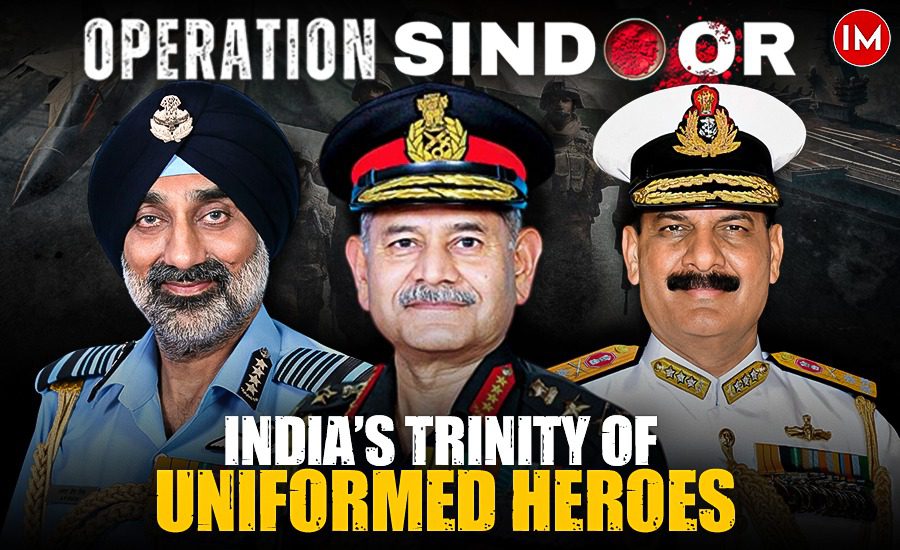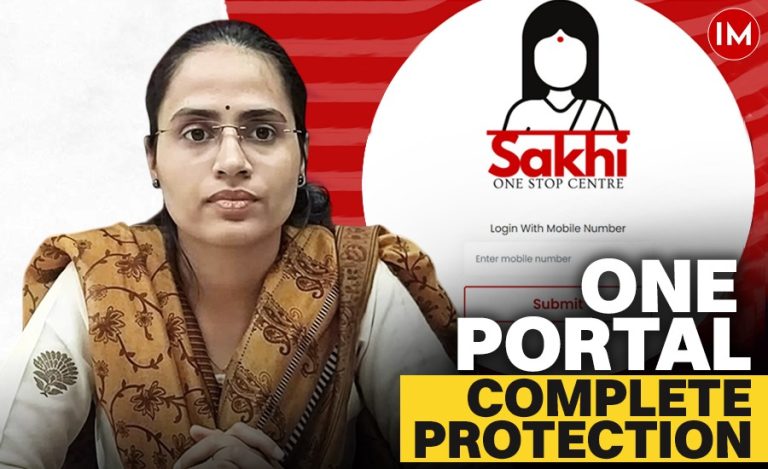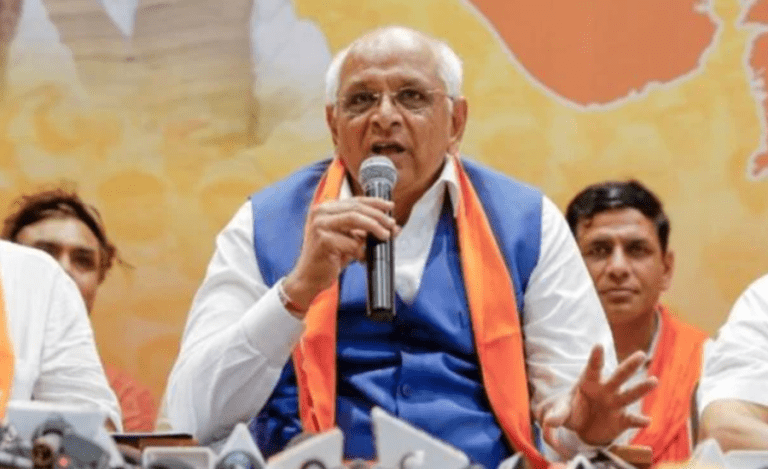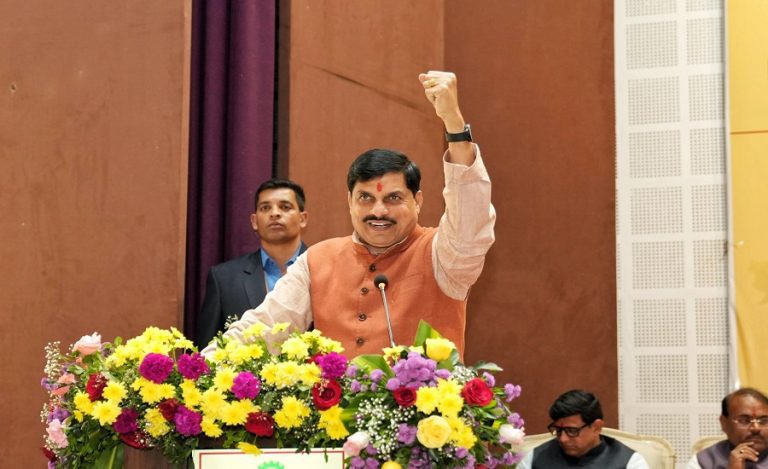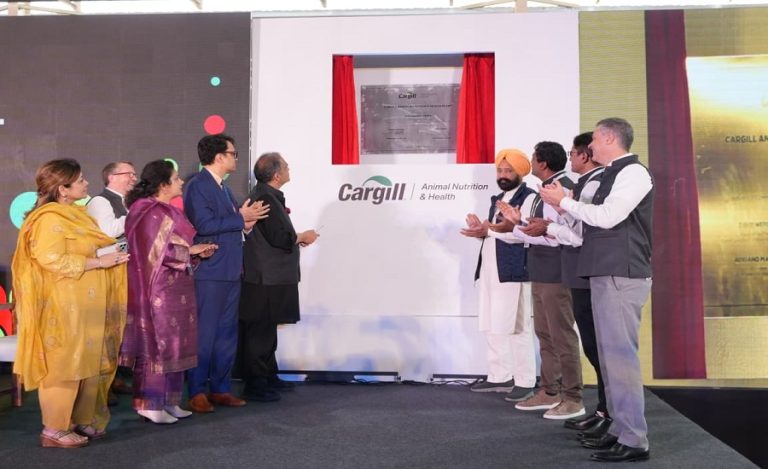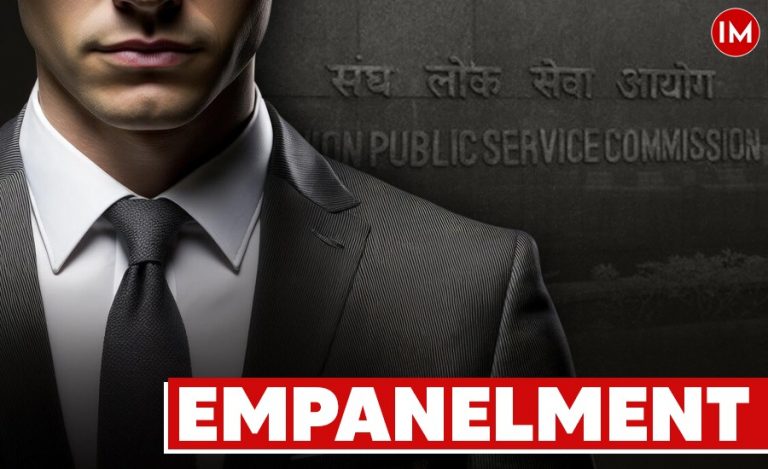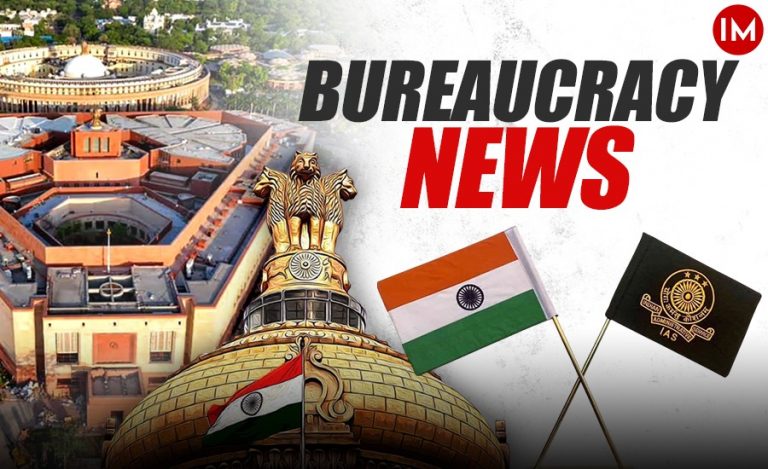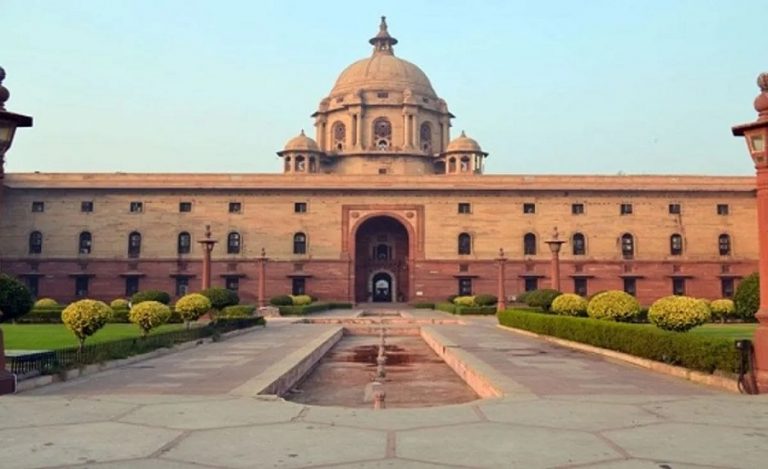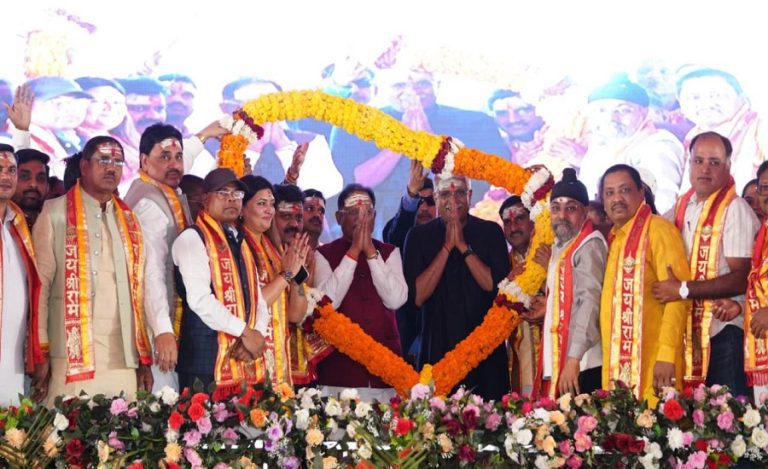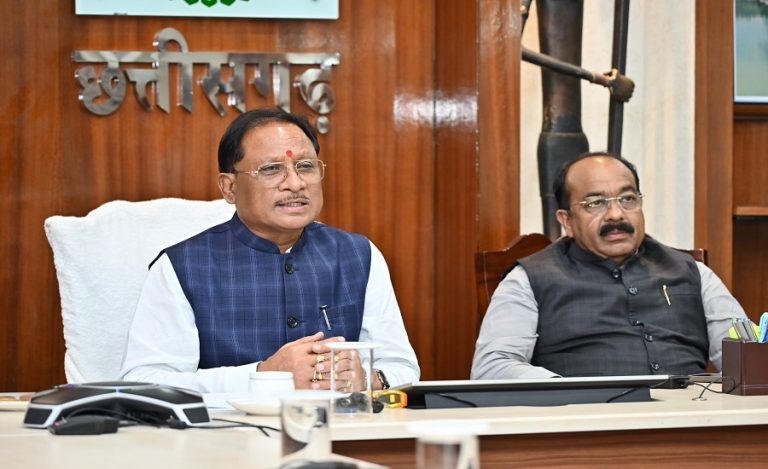Amid escalating tensions and evolving security threats from across the border, the Indian government has empowered the Chief of Army Staff with enhanced authority, recognising the critical role of swift and decisive military action in safeguarding the nation.
At the forefront of this dynamic leadership are three of the most formidable military minds in the country: General Upendra Dwivedi, Air Chief Marshal AP Singh, and Admiral Dinesh Kumar Tripathi. Together, these officers epitomise the might and resilience of India’s Armed Forces—forces that are not only prepared to defend the country’s sovereignty but are also equipped with cutting-edge technologies and strategies to face any adversary head-on.
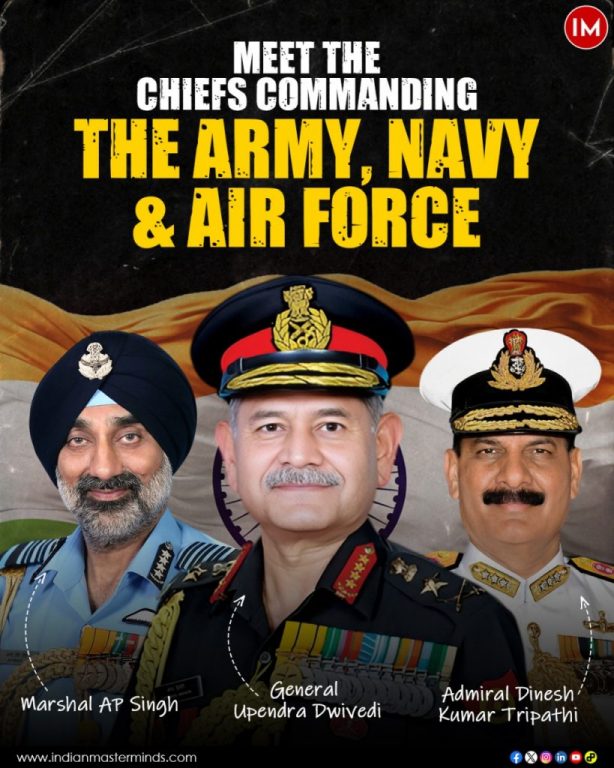
Their collective expertise and leadership have been instrumental in the execution of Operation Sindoor, a bold and strategic operation that showcases the unmatched capabilities of India’s military in responding to emerging challenges with precision, strength, and resolve.
Operation Sindoor was planned by the Chief of Staff Committee (CoSC) which is an inter-service syndicate of the armed forces, functioning as a principal advisory body dealing with matters related to inter-service coordination, policy formulation and strategy-making. It comprises the chiefs of the three armed services, to be chaired by the Chief of Defence Staff (CDS).
Let us find out who these four officers are and what their experience is in dealing with critical situations like these.
CHIEF OF THE ARMY STAFF – GENERAL UPENDRA DWIVEDI
General Upendra Dwivedi assumed command of the Indian Army as the 30th Chief of the Army Staff on 30 June 2024. Prior to this, he served as the Vice Chief of the Army Staff from February 2024. A highly decorated officer, he is the recipient of the Param Vishisht Seva Medal, Ati Vishisht Seva Medal, and three GOC-in-C Commendation Cards, reflecting his exemplary service and leadership.
As the General Officer Commanding-in-Chief (GOC-in-C) of the Northern Command from 2022 to 2024, he provided strategic direction and operational oversight for sustained border management and counter-terrorism operations. Under his leadership, the command underwent significant modernisation, including the induction of indigenous weapon systems under the Atmanirbhar Bharat initiative. He also strengthened civil-military synergy by working closely with communities in Jammu, Kashmir, and Ladakh, promoting infrastructure development and national integration.
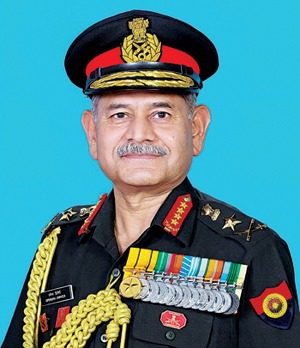
His staff experience includes overseeing operations of an armoured brigade in Punjab, managing logistics for a mountain division along the Northern borders in the Northeast, and contributing to strike corps operations in the deserts. At Army Headquarters, he played a pivotal role in the Military Secretary’s Branch, helped establish a new section within the Military Operations Directorate, and as Director General of Infantry, he fast-tracked capital procurement projects that enhanced tri-service combat capability.
As Deputy Chief of the Army Staff, General Dwivedi championed the integration of cutting-edge technologies in the Army. A tech enthusiast, he led initiatives to raise the technological proficiency of personnel, promoting emerging technologies such as Artificial Intelligence, Big Data Analytics, Quantum Computing, and Blockchain. His efforts were instrumental in laying the groundwork for a more agile, future-ready force.
Hailing from Madhya Pradesh, General Dwivedi studied at Sainik School Rewa, where his journey of excellence in academics and sports began. He joined the National Defence Academy in January 1981 and was commissioned into the 18th Battalion of the Jammu and Kashmir Rifles on 15 December 1984—a unit he later commanded in both the counter-terrorist operations in the Kashmir Valley and in the deserts of Rajasthan. He excelled in physical training from his early days, earning the ‘Blue’ in NDA and IMA and later securing a gold medal in the Physical Training Course after commissioning.
Over the course of four decades, General Dwivedi has held several critical command, staff, and instructional appointments, gaining extensive operational experience across the Northern, Western, and Eastern theatres. His exposure includes deserts, high-altitude terrain, riverine and built-up areas, as well as counter-insurgency environments in Jammu & Kashmir and the North East. He held key command roles such as Sector Commander in the Assam Rifles, Inspector General Assam Rifles (IGAR), and later led the Rising Star Corps along the Western front.
Internationally, he has served in Somalia with UNOSOM II, and later as Military Advisor to the Government of Seychelles, enhancing India’s global military engagements. His academic credentials are equally distinguished: he holds an M.Phil. in Defence and Management Studies, along with two Master’s Degrees in Strategic Studies and Military Science, one of which was earned during the NDC-equivalent course at the United States Army War College (USAWC), where he was honoured as a Distinguished Fellow. He has also contributed thought leadership through papers and articles in various professional forums and journals.
CHIEF OF THE AIR STAFF – MARSHAL AP SINGH
Air Chief Marshal Aman Preet Singh, the 28th Chief of the Air Staff of the Indian Air Force, brings with him decades of operational excellence and technological expertise. He has held several critical staff appointments, including Air Defence Commander at the South Western Air Command and Senior Air Staff Officer at the Eastern Air Command. Before assuming his current role, he served as Vice Chief of the Air Staff, overseeing strategic air operations amid evolving national security dynamics.
Colleagues who have worked closely with him describe him as a sharp, analytical thinker and a hands-on leader known for his warm, approachable nature. He is respected among peers for being frank, humorous, and grounded. Outside of the cockpit and command rooms, he is a long-distance runner and an avid squash player, enjoys cooking, and strongly believes in maintaining fitness and work-life balance.
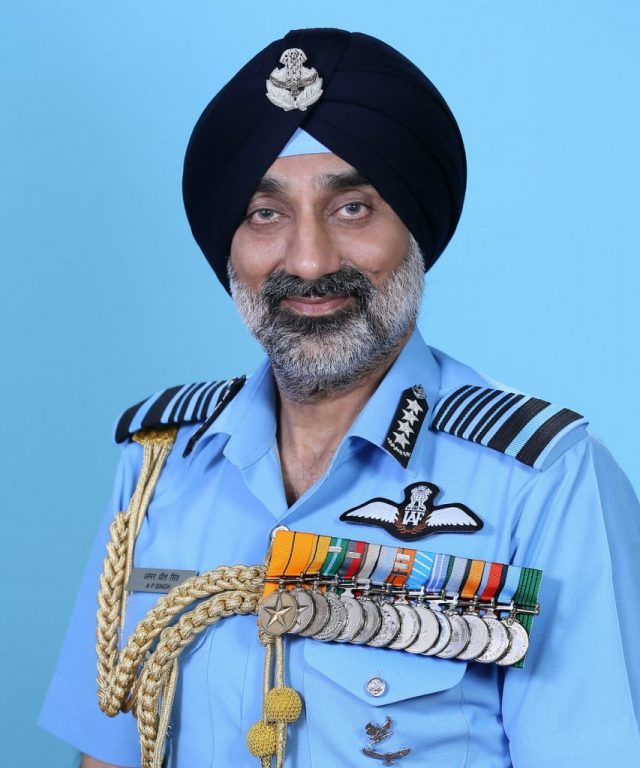
His leadership has been instrumental in strengthening India’s air defence preparedness, especially in the face of cross-border challenges and counterterrorism operations. Under his command, the Indian Air Force continues to modernise, innovate, and dominate the skies with unwavering confidence.
Commissioned into the fighter stream on December 21, 1984, he has amassed over 5,000 flying hours on a variety of fixed and rotary wing aircraft. A Qualified Flying Instructor and an Experimental Test Pilot, his early education was at a government school in Janakpuri, Delhi. He later graduated from the National Defence Academy (65th Course, Kilo Squadron), where he served as the Squadron Cadet Captain. He is also an alumnus of the Defence Services Staff College and the National Defence College.
During his distinguished career, Air Chief Marshal Singh has commanded a MiG-27 squadron and a frontline air base. As a test pilot, he led the MiG-29 Upgrade Project Management Team in Moscow, Russia, and later served as the Project Director (Flight Test) at the National Flight Test Centre, where he played a pivotal role in the flight testing of India’s indigenous Light Combat Aircraft, Tejas.
CHIEF OF NAVAL STAFF – ADMIRAL DINESH KUMAR TRIPATHI
Admiral Dinesh Kumar Tripathi, the Chief of the Naval Staff of the Indian Navy, brings a wealth of experience spanning nearly 39 years. A specialist in Communication and Electronic Warfare, Admiral Tripathi’s leadership has shaped critical naval operations, particularly in the Western Naval Command. Prior to his appointment as the Navy Chief, he served as the Flag Officer Commanding-in-Chief of the Western Naval Command, where he was responsible for overseeing maritime security along India’s western coastline. He was the Vice Chief of Naval Staff prior to taking over as Navy Chief.
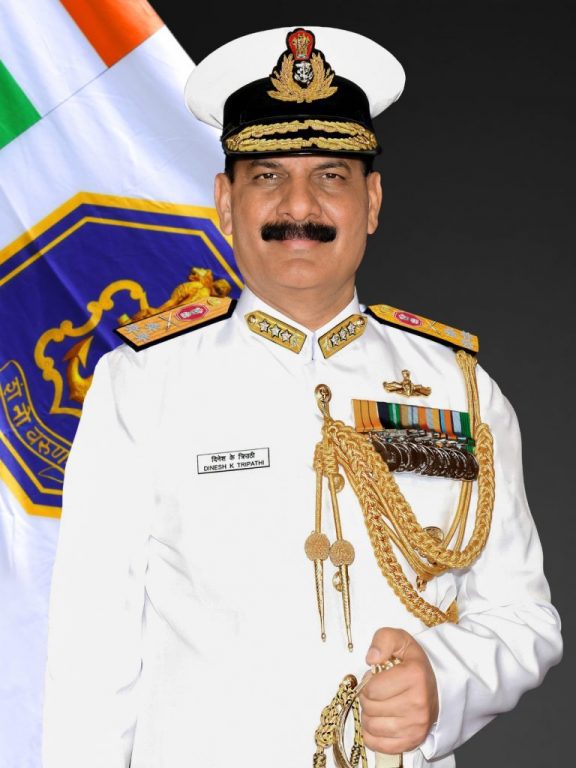
Admiral Tripathi has commanded several naval ships, including INS Vinash, INS Kirch, and INS Trishul, and held key operational roles such as Fleet Operations Officer of the Western Fleet and Director of Naval Operations. His leadership was instrumental in strategic initiatives, including his tenure as the Chief of Personnel and Flag Officer Commanding-in-Chief, Western Naval Command.
An alumnus of the National Defence Academy and the Naval Command College at the United States Naval War College, Admiral Tripathi has contributed significantly to modernising India’s naval operations and ensuring maritime security during times of heightened tensions.
Together, General Upendra Dwivedi, Air Chief Marshal AP Singh, and Admiral Dinesh Kumar Tripathi represent the pinnacle of India’s military leadership. Their combined expertise in land, air, and maritime operations was instrumental in the success of Operation Sindoor, a strategic response to the complex security challenges posed by India’s adversaries.

